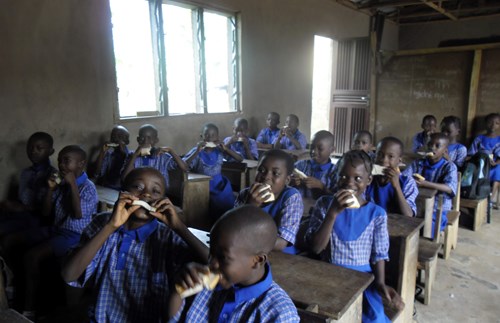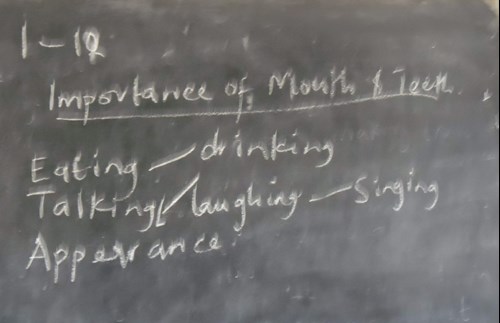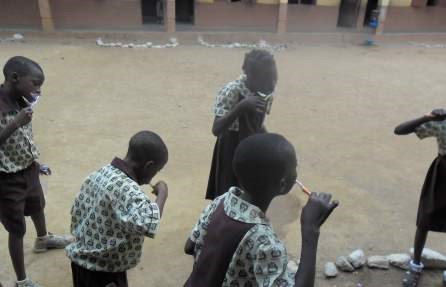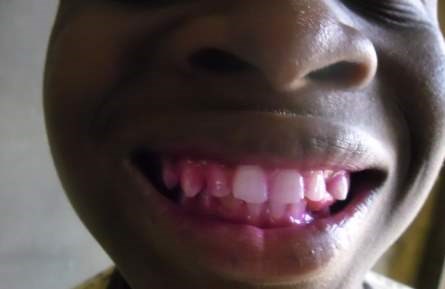Nigeria - A School based oral health education programme for Children
Nigeria - A School based oral health education programme for Children
A School based oral health education programme for children in Ile-Ife, Nigeria (2011-2014)
by Stjernswärd J, Folayan MO and Esan AO.
Introduction
Schoolchildren in Ile-Ife suffer from caries and poor oral hygiene. It is obvious that without oral health education and structured intervention, the frequency of caries in the primary teeth will increase with time. A five year community based programme therefore was launched in Ile – Ife by the Ile – Ife central government. This was the first such effort in the whole of Nigeria.

Background
In addition, this programme was implemented to improve the continuous low use of dental services in this area for the past 25 years and to change the myths and misconceptions about oral diseases that affect children’s health.
First a community based education programme was launched and after a year, in 2011, the School based education programme commenced.

Programme Outline
Community based education programme
- The community based programme was launched a year before 2010 commencing the school based programme in order to ensure community support and understanding for the school based programme.
- Pregnant mothers that attended the three antenatal clinics provided by public hospitals in the local government were targeted so as to address the local myths and misconceptions about oral health and provided education on proper oral health care for infants and children. This continued for the whole length of the programme, for 5 years. A 30 minutes curriculum was developed to help public discussions.
- A general public oral health education was undertaken for the parents. Several churches, mosques, community groups and organizations and parent - teacher Associations were included. A 30 minute curriculum was developed to help public discussions.
- Class teachers in the six schools in the study group were trained in year 3 of the programme during a three days workshop, on the use of the oral health education curriculum, with discussions on how to integrate the curriculum into ongoing class sessions.
School based education programme
- Children enrolled in six primary schools were the study group while children from three other primary schools were the control group.
- The Paediatric Dentistry Working Group involved in the Child Oral Health Wellness Project developed the curriculum for the primary schoolchildren.
It was based on the school oral health education curriculum developed by the American Association of Paediatric Dentists. - All the children in classes 1 – 6 in the primary schools were exposed to a minimum of five educative, interactive and fun - filled education sessions each year.
- At the end of the programme after four years, a child who started the programme in class I would have been exposed to 20 oral health education classes in all.
- Each year, the children received a toothbrush and an oral examination.
- No special programme was provided to the control group of three schools. These children had access to oral health education otherwise provided during classes, and were provided with a toothbrush.
Outcome
- The programme was assessed by a questionnaire, where children in their final and penultimate years participated (179 children from the study group and 62 from the control group).
- Children from the study group (97.8%) were more likely to report frequent use of fluoride containing toothpastes versus (83.9%) from control group.
- The study group was more likely to brush twice a day (36.3%) compared to the control group (21%).
34% of the study group eat sugar snacks less than once a day meaning eating sugar snacks rarely and 48.4% of the control group significantly admitted to eating less than a day. - The study group was also less likely to use dental floss (3.9%) compared to the control group that was 19.4%.
The use of the dental services in the last one year was more prevalent (22.6%) in the control group versus 7.3% in the study group.

Comments
The reason for decreased use of dental services by the study group maybe that due to the education programme the need for curative treatments were less in this group.
The less use of dental floss and the increased consumption of sugar snacks by the study group need to be investigated.

Conclusion
First time in a community and school based oral health programme was conducted in Nigeria, which is very positive. This school based programme was successful in increasing the fluoridated toothpaste use and tooth brushing among the schoolchildren.
Reference
Esan A, Folayan MO, Egbetade GO, Oyedele TA. Effect of a school-based oral health education programme on use of recommended oral self-care reducing the risk of caries by children in Nigeria. Internat J Paed Dentistry. 2014.
The pictures for this presentation were provided by Dr A. Esan.
